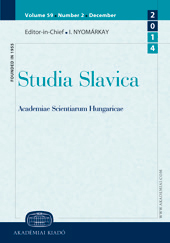Эпизод из истории литературных контактов: рецепция сочинений Франца Костера SI в книжной культуре Речи Посполитой XVI–XVII вв.
Episode from the history of literary contacts: reception of works by Franz Coster SI in the book culture of the Commonwealth of the 16th-17th centuries.
Author(s): Margarita A. KorzoSubject(s): 16th Century, 17th Century, Hermeneutics, Translation Studies, Sociology of Religion, History of Religion
Published by: Akadémiai Kiadó
Keywords: Franz Coster; Polish–Lithuanian Commonwealth; literary contacts; Orthodox religious literature;
Summary/Abstract: The history of the ascetic works composed by the Flemish Jesuit Franz Coster (1531–1619) and their translations into Polish and “prosta mova” are considered as an interesting example of the 17th-century literary contacts in Europe and an example of the spread of Catholic works among adherents of Orthodoxy. Coster’s Bulla super forma iuramenti professionis fidei (1576) was originally intended to members of the Catholic Sodality of the Blessed Virgin Mary in Cologne. Two Polish-language reversed editions entitled Skarb duszny (1582 and 1594) served as a source of a concise text of admonition written in “prosta mova” to the confession Nauka i priklady, which can be found in two editions of the 17th-century Orthodox Vilna’s Poluustav: ca. 1637–1640 and ca. 1643–1644. The Polish translation later was taken as a basis for drawing up a manual of confession Nauka o tainie svyatogo pokayaniya (1671) published in the Kiev Monastery of the Caves. The question of the translator from Latin into Polish as well as the translator from Polish into “prosta mova” remains open.
Journal: Studia Slavica Academiae Scientiarum Hungaricae
- Issue Year: 62/2017
- Issue No: 1
- Page Range: 21-33
- Page Count: 13
- Language: Russian
- Content File-PDF

